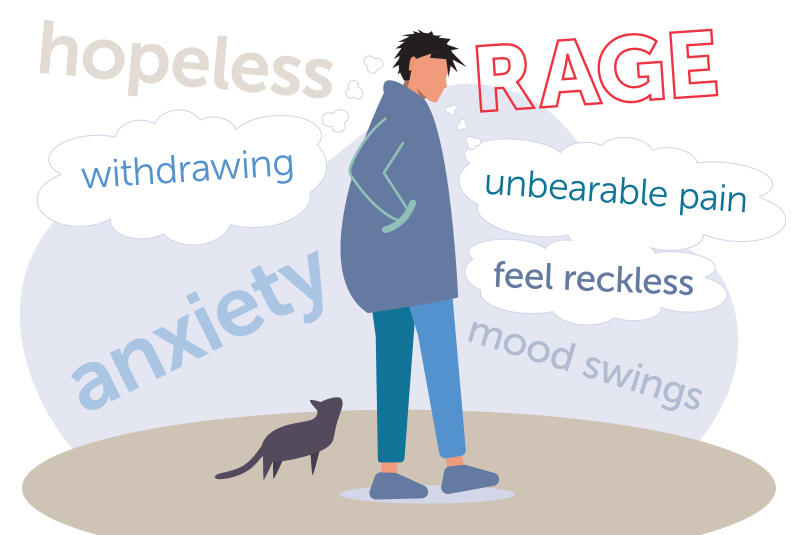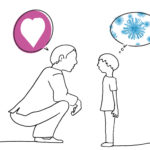COVID and suicidal thoughts: Help for families

Earlier this month, the U.S. Centers for Disease Control and Prevention (CDC) released stark new figures on mental health during the COVID-19 pandemic. One in four young adults (age 18 to 24) surveyed reported seriously considering suicide during the previous 30 days — an increase from years past. Rates of suicidal thoughts were also high in Black and Latino Americans.
Although less is known about teens and younger children, they too appear to be experiencing increased mental health concerns, says Kimberly O’Brien, PhD, a clinical researcher in psychiatry at Boston Children’s Hospital who studies suicide. “Anxiety is elevated across all groups now,” she explains. “Children see their parents’ stress and feed off of that. We can’t say the pandemic isn’t affecting kids.”
Different risks for different kids
Know the warning signs
- talking about wanting to die
- looking for a way to kill oneself
- talking about feeling hopeless or having no purpose
- talking about feeling trapped or in unbearable pain
- talking about being a burden to others
- using alcohol or drugs
- acting anxious, agitated, or reckless
- sleeping too little or too much
- withdrawing or feeling isolated
- showing rage or talking about seeking revenge
- displaying extreme mood swings
There’s any number of reasons why younger people could be feeling anxious, depressed, or even suicidal. Young adults, who are ready to enter college or the workforce, may feel angry and resentful about their loss of freedom. For teens, who are typically quite social, isolation can be devastating. Younger children may lack the ability to properly recognize and express how they’re feeling. And kids of all ages whose identities are tied to extracurricular activities like sports, band, and theater are feeling lost without those outlets, or with changes to the way the experience them.
So how can parents help? The best thing you can do is listen to your child and validate their feelings,” says O’Brien. “Join them in brainstorming solutions that are within their control.” For example, if they’re upset about school being remote, join with them in expressing how hard that is, and work together to figure out a way for them to set themselves up for success given the constraints of online learning. Or if they are upset about not being able to see their friends, empathize with their sadness and see if you can work with them to find a way to connect with friends that feels fun and enjoyable, even if it’s not in person.
It’s also more important than ever to talk with your child or teen about mental health and suicide,” says O’Brien. Here, she offers tips for making those difficult conversations a little less challenging.
Consider your child
There are plenty of ways to talk about suicide with your child, particularly if you don’t have specific concerns about their mental health and just want to get ahead of the game — the key is to be open and honest. You might start by saying something like, “I’ve seen some reports about suicide in the news lately. What do you think about that? Have you ever had thoughts about killing yourself?” Keep in mind that your child isn’t necessarily going to respond honestly,” says O’Brien. In fact, they may groan and roll their eyes. But you’ve shown them that you’re comfortable talking about the issue, and they’ll remember that.
If you’ve noticed that your child’s mood has gotten increasingly depressed or anxious as the pandemic has continued, you’ll want to take a more direct approach. You might start by asking, “I’ve noticed you’ve been feeling more down and worried as quarantine has gone on. How are you doing with all of this?” That can lead to your next question: “Sometimes when people feel sad or worried, they think about dying a lot. Is that something you think about?” If they say yes, ask them specifically about suicidal thoughts: “Has it ever felt so bad that you’ve thought about killing yourself?”
Make it age appropriate
Match your conversation to where your child is developmentally, advises O’Brien. For example, if you’re really worried about your 10-year-old, you could say, “Sometimes kids feel like they want to die. Sometimes they want to do something to make themselves die.” Use the language you normally would use with them. “Parents underestimate their ability to talk about this, but it’s more powerful coming from you,” she says. Just like talking about sex, this isn’t a comfortable conversation, but it’s an important one.
Be prepared for the next steps
If your child says they feel suicidal and you’re not sure what to do next, you can contact Boston Children’s and ask to page psychiatry on-call, where a clinician can help you determine the next steps and if you should bring your child in for an evaluation. Likewise, all towns have a mobile crisis team that you can access. “Don’t feel guilty or ashamed to ask for help,” says O’Brien. “If you’re concerned, go with your gut and know that you’re not alone.”
If you are in crisis, please call the National Suicide Prevention Lifeline
at 1-800-273-TALK (8255), or contact the Crisis Text Line by texting TALK to 741741.
Related Posts :
-

Is your teen depressed? Seven tips for parents
Your son comes home from school, slams down his books, and retreats to his room with a scowl. Since starting ...
-

Answers to six questions about anxiety in children and teens
Between school and social demands, lots of children feel stress, but at what point does anxiety cross the line and ...
-

Dealing with feelings of grief in the time of coronavirus
As the COVID-19 outbreak moves into another month, do you find yourself feeling angry? Helpless? Sad? Lost? Disappointed? Accepting? Or ...
-

It’s okay to be scared: Talking about COVID-19 with your kids
Images and stories of the global COVID-19 pandemic surround us, and it’s normal for kids to have questions. There’...





